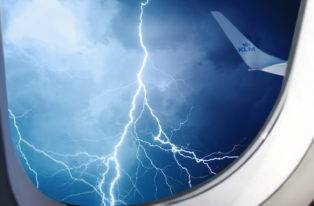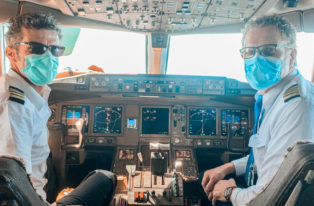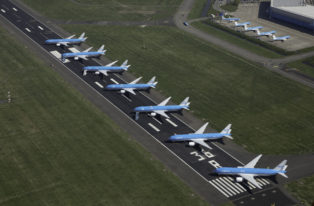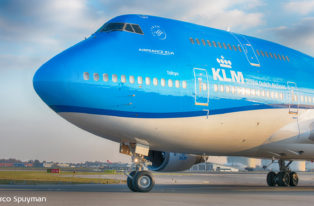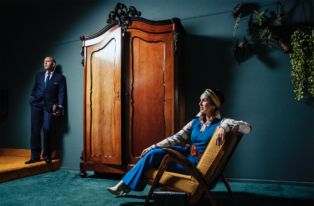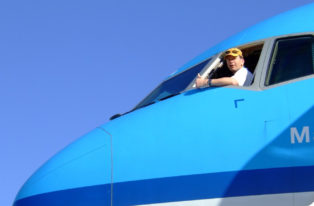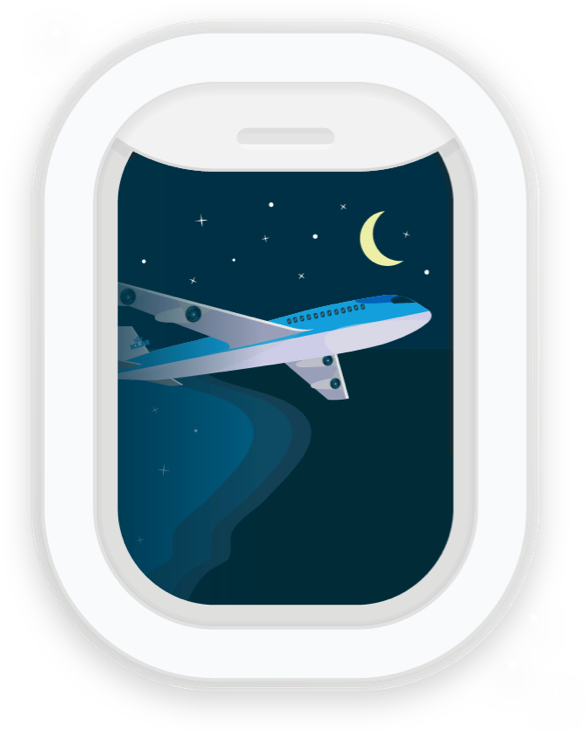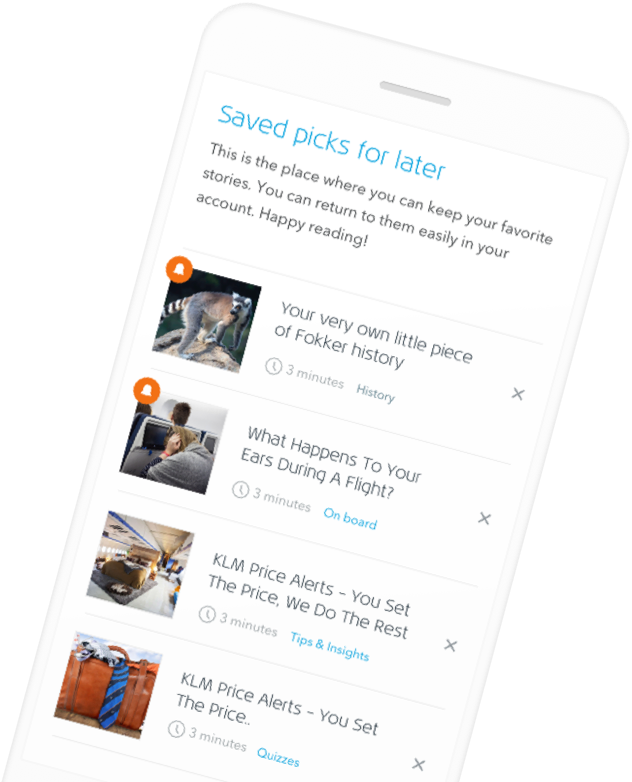Taking off with… Nancy Put-Serlé | Flight Dispatcher
Besides planning flight routes, Nancy solves the widest variety problems in her everyday work as Flight Dispatcher. Turbulence on the route? Nancy knows what to do. Volcanic eruption? She has the solution. Every day, any number of unexpected situations come her way, requiring her to multitask at the OCC. A cold-blooded ice queen, you might think? That’s not what you get when you stand across from her. Nancy gives you a warm smile and tells you everything you might want to know about the problems she encounters. She explains why she loves working in shifts and she talks about her greatest passion: travel.
- Date of birth: 9 August 1965
- Place of birth: Amsterdam
- Position: Flight Dispatcher in het OCC
- Personal: Nancy is married to Rolf and has a 19-year-old son.
- Career: Started at KLM in 1986 working with the pension fund.
Flight dispatcher
During the flight we keep an eye on the aircraft and all associated circumstances. We are the first point of contact for the crew on board. No matter what the problem is, no matter what they need in terms of assistance, they come to us first, and we have to try to solve it for them.
These can involve any number of things. We map out the routes from A to B and back again. Then you have to take the weather, military zones , hurricanes, volcanic eruptions, into account – and all the applicable rules and procedures. But we also provide support for medical problems, technical issues, or unruly passengers on board, any of which might even call for a stopover. Basically, we’re flying in the cockpit indirectly, but from the ground.

Contact with the cockpit
We are in constant contact with the flight cockpit. We can call or send text messages back and forth. The pilots have contact with Air Traffic Control, for instance, for permission to depart, to change flight altitude, or to deviate from their routes. We are there for all other issues. For example, we can advise them to deviate from their route if we see turbulence or bad weather ahead, but ATC must give final permission.
Your job
At the OCC we work in three regions – Europe, East, and West – and in three shifts: early, late, and night shift. We have five or six people working per region, per shift. If you handle intercontinental flights, you will have a total of ten to twelve inbound and outbound flights under your care during early and late shifts. If you handle European flights, you’ll have many more because they are shorter stretches. I like handling intercontinental flights the most. During the night shift it is a completely different story. Then you just have two people working in one region. We have to go straight into overdrive! There is absolutely no thought of falling asleep or getting tired. We start at 10:30 PM and, sometimes, we only have time to go to the toilet at 6:00 AM. Sometimes you can really get stuck to your chair for a long period, because the two of you are taking over the work of five or six people. That’s a little more than twice the number of flights.
My career at KLM
I started here on 1 February 1986, first at the KLM Pension Fund. Really that was just to get my foot in the door. I wanted to work for KLM so badly. I had responded to an advertisement but didn’t get any response. A year later I received an invitation for an interview but, by then, I couldn’t remember which position I had applied for. I went to the archive of the newspaper Het Paroolto see which vacancy it had been. Even so, during my job interview it turned out to be a completely different job! Apparently they had held onto my CV and found me again when a new job became available. I thought, once I arrived, I’ll find my way. I really wanted to work for KLM. Personally, I love the all travel that the work let me do.
After working here for a year, I was able to apply internally and ended up in the baggage cellar. There I worked on baggage planning for short-transfer passengers and then I worked in the scheduling office. One time, I was sitting in the train with a colleague and he said, “Wouldn’t this be a good job for you?” I didn’t even know that the department even existed so I visited them for a day. It was really nice. So I came here purely by chance in 1989 and I’m still there today. It’s a pretty long time to work for thirty years in one department. But my job has had many different names over the years and the job content has changed at least as often, so it has felt like a new job. I never had to apply for another job.
I remember September 11, 2001 well. I had a late shift and was on my way to work when the first plane flew into New York’s World Trade Center. I only got to see it once I had arrived here. We didn’t imagine that it could be an attack – more likely an accident involving a small plane. When the second plane flew into the WTC, then we knew it was an attack. It was so unreal. The entire American airspace was closed. Immediately we had all hands on deck because there were so many flights on their way to the US. We had to direct all those flights back home or, if that was no longer possible because they had insufficient fuel, we had to send them to Iceland or Canada. Nothing was allowed into American airspace anymore. I was working in the Europe region at the time and I helped in the West region. We all had chills going down our backs. This kind of thing only happened in movies.
Indispensable skills
You have to be able to multitask well. Sometimes you have your brain working in five places. One thing is running here, there’s an issue over there, this one’s almost solved and, in the meantime, the phone rings. You have to be able to set clear priorities and you need good problem-solving skills. You have to be analytical, stress resistant, and you have to coordinate well on conference calls. I don’t have a solution for everything. Sometimes I have to call in other experts. Sometimes all six of you are on the phone while an aircraft needs a solution to a problem.

Emergencies
There are always different experts available in the event of an emergency. We have technical specialists and doctors who can be called 24/7. It can happen that, during a shift, you’ll have to call a doctor several times in the middle of the night. What I find remarkable is how often there is a doctor on board. But the KLM doctor always has the last word.
The best thing about my job
My workday is always different. Sometimes I only have a few flights to take care of. But that can result in one problem after another that keep me busy. On other days, I’ll handle ten flights with no disruptions at all. You never know what the day will bring. I like that. I also love working night shifts because I never have to take time off if a mechanic has to come by or because I have to go to the dentist. I plan those things for my day off and I shop during quiet hours. I always work with different people. It’s never a permanent club. That’s also an advantage. And when I go home, my work is done. Someone else takes over and finishes it. When I return from holiday, there is no mountain of work waiting for me. That’s really nice.
Mutual contact
Very often the dispatchers help each other out. If you have a difficult flight, there is always someone who says, “Shall I take this flight over?” Those offers go back and forth between us and that works very well.
Travelling for work
Once a year we have to go an observation flight. We fly in the cockpit and discuss any possible points for improvement concerning cooperation with the pilots. It’s interesting to see how things are going on the route. It helps to promote mutual understanding. Last year I flew to JFK. In January of this year I went to Manchester and next year I’ll go into the flight simulator. During an observation flight to Toronto, Dutch DJ Armin van Buuren was on board and invited the whole crew to come to his performance that evening. That was great, of course. What are the odds that you’ll get a chance like that when you only have one intercontinental observation flight every three years?

Top day
The best kind of day is when the team works well together, when there are problems that we all solve well, and when people are happy. It’s great when people appreciate what we’ve done.
Dealing with stress
I don’t have any specific tricks to deal with stress, but you learn as you go. I didn’t deal with stress well in the past. Now I can now put things into better perspective. It relaxes me to take part in sports and I like that. I have a sedentary profession so it’s important to exercise. Fortunately, for the past year, we have all had desks that can adjust to a standing position. That’s much better for your body.
On my day off
I try to get some extra sleep, though I don’t succeed very often. I usually work early shifts and I’m out of bed at 5:00 PM. Sleeping until 7:00 is late for me! It’s great to start my days in the gym. I’ve been here for 25 years and I know most of the people. That’s great fun. You can find me in the cinema pretty regularly. I like going to the theatre and getting a bite to eat afterwards. I’ve been taking a Spanish course for the past few months. That takes a lot of time.

Hobbies
My greatest hobby is travelling. That’s why I joined KLM. I already have some ideas for my next trip, but I’m always open to suggestions. My son recently said he wants to go diving, so maybe we’ll visit a tropical island. Anyway, he still likes going with me. How much fun it would be to have a hobby in common?
An unknown job
Very few people do this work. I always have to explain what it means to be a flight dispatcher. When I say I map out routes, people invariably ask, “Do you work in the tower?” I can understand that people think that. I didn’t even know this job existed and I would probably have asked the same things. It’s a unique job.
The OCC opened in 1999. All disciplines are combined there, so the lines of communication are as short as possible. That allows us to make operational decisions quickly – whether we’re going to have a delay, or perform an aircraft change, or a cancellation – you name it.
Typically collegial
Night shifts are holy. If anyone calls in sick, we’ll do everything we can to operate with a full team. It’s amazing that we always manage to solve the issue. Everyone is very collegial. It’s difficult to take time off during school holidays. There are many colleagues with school-age children and everyone wants to be free during those periods. But we usually work it out because people are willing to cover for each other. In the end, everyone can go on holiday but it takes some doing.
Introduction to the job
The job calls for a long introduction period and a lot of training before you can start working independently. It’s pretty intensive, after all. Even so, I think you learn the most as soon as you start working independently without a mentor next to you. It’s a little like driving a car. There are always colleagues around whom you can call on to ask things, and everyone is always willing to help.
Later…
I want to travel even more! It’s in my blood. I love experiencing how people live in other places in the world, how it feels and smells. Travelling enriches your life and it often makes me realise how good we have it here.

Pop music idols
My musical taste is extremely diverse. From the Red Hot Chili Peppers to André Hazes, from the Commodores to Elvis Presley. I recently saw the movie “Bohemian Rhapsody.” What a great man Freddie Mercury was. I think the same of Prince. Besides their music, I admire their passion – reaching for heights without any backup plan. Only a Plan A and no B. Or, like me, a Plan C or D. If only I was a little more like that.
Happiest memory
I told my colleagues I was travelling alone to Tanzania and, completely spontaneously, a colleague said, “Great, I’m going with you.” I said, “OK,” thinking he won’t do that. But he did. It was a fantastic three-week trip. We went on safari for ten days, slept in a tent among thousands of migrating wildebeests and climbed Kilimanjaro. Five years later, we got married on Bonaire and we’ve been married for 25 years this year. I’ll never go to Tanzania for a second time, because nothing can ever top that trip. You just have to leave some memories as they are.


Most beautiful holiday destination
There are so many beautiful places in the world. I can’t choose a single favourite holiday destination.
Roots and life lessons
I have Indonesian roots. I lived in a small village when I was young and experienced a lot of narrow-mindedness. I know what it feels like to be discriminated against. As a nine-year-old girl I moved from there to Amsterdam. The big city seemed very scary at the time. But the fear proved to be unfounded and I have since taken Amsterdam into my heart. I amsterdam. I will never discriminate against people. Everyone is who they are.
In my home…everyone can be themselves.
My heart’s desire
We spent a week in Thailand on a “liveaboard” to spot whale sharks. We saw lots of other beautiful animals but the whale sharks did not appear, so I want to go see them again. I also want to learn to play an instrument. There already a piano at home but I don’t have time for it, yet.

